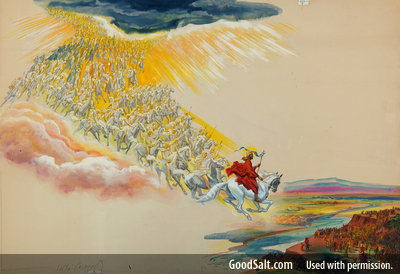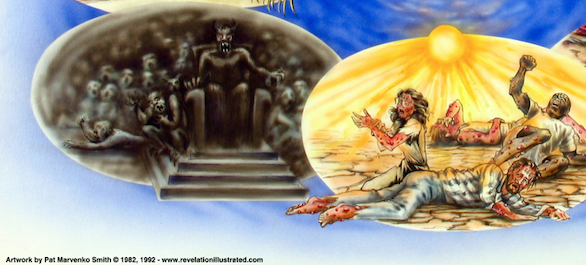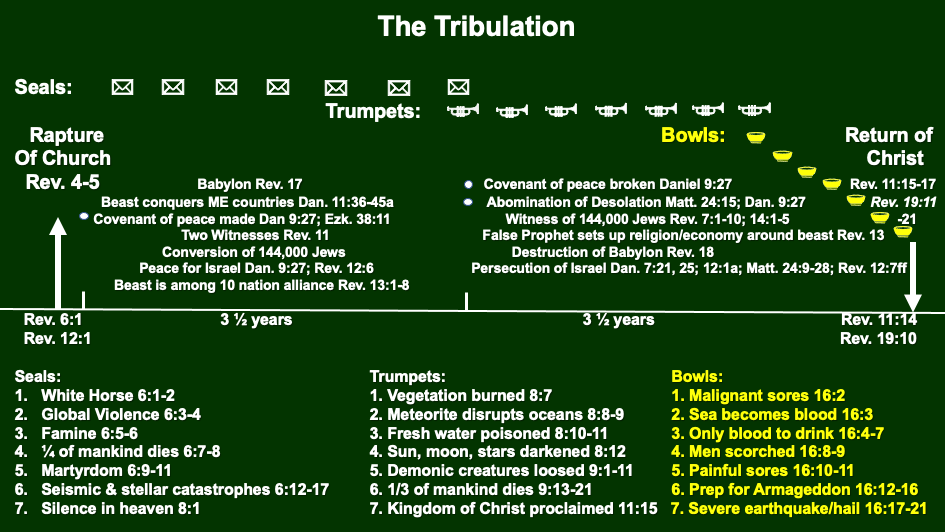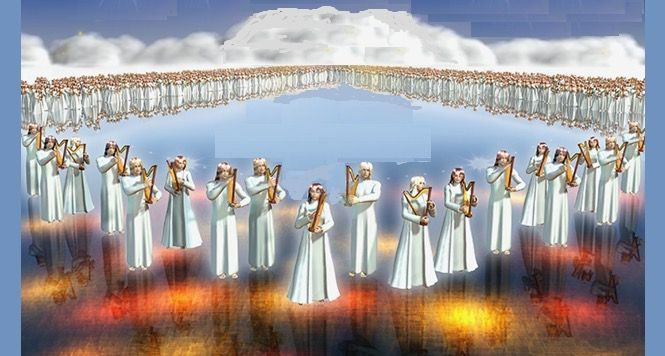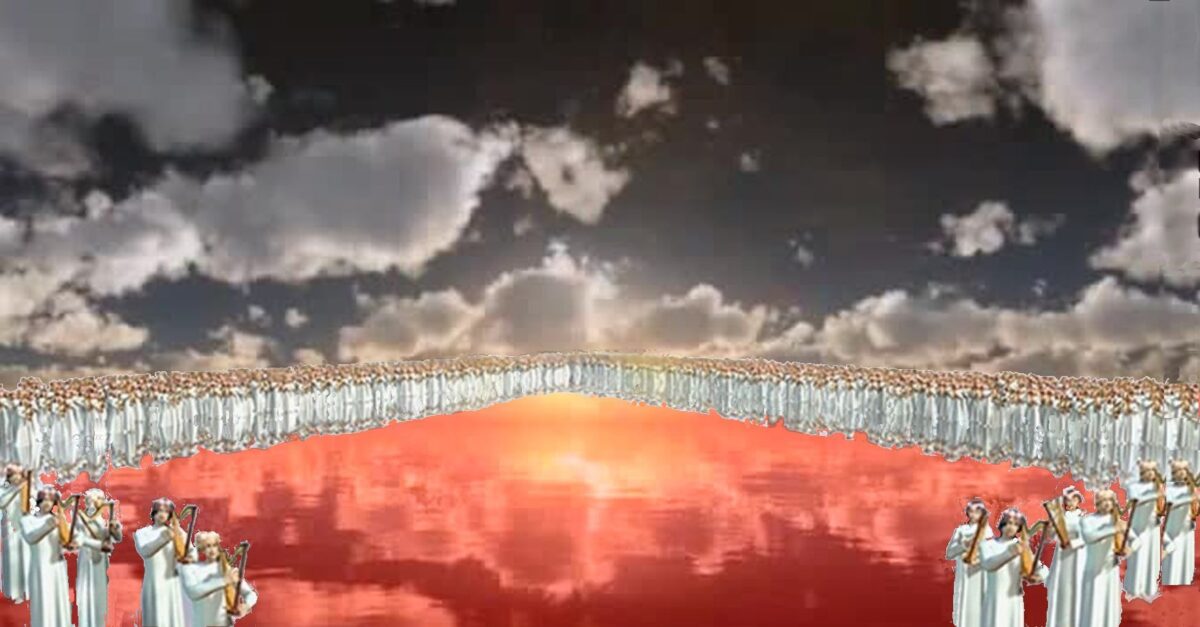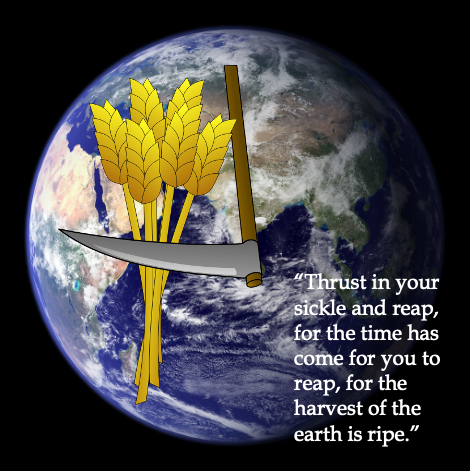“And they gathered them together to the place called in Hebrew, Armageddon.” Revelation 16:16
As the conflict between Russia and Ukraine continues and the various challenges of a global pandemic linger, many people may wonder who is in control of planet earth. But those of us who believe in Jesus Christ must remember that God remains in control no matter what takes places or what others may think. The Lord is bringing events to their appointed end, and one of the important events that crowns the Tribulation period is identified by one menacing word – Armageddon! 1
When the Japanese surrendered in 1945, General Douglas MacArthur uttered these formidable words: “We have had our last chance. If we will not devise some greater and more equitable system, Armageddon will be at the door.” 2 In 1971, then California governor, Ronald Reagan, told a fellow politician, “For the first time ever, everything is in place for the battle of Armageddon and the second coming of Christ.” 3
“Again in 1983, President Reagan said, ‘You know, I turn back to your ancient prophets in the Old Testament and the signs foretelling Armageddon, and I find myself wondering if – if we’re the generation that is going to see that come about. I don’t know if you’ve noted any of those prophecies lately, but, believe me, they certainly describe the time.” 4
Billy Graham in his book, Till Armageddon, writes, “There is no doubt that global events are preparing the way for the final great war of history – the great Armageddon!” 5
The word “Armageddon” is found only one time in the Bible (Revelation 16:16), but it is probably one of the most familiar biblical terms associated with end times prophecy. Most people have heard of Armageddon, but like many other terms, the real meaning of the word often is lost by overuse or misuse. To help us understand end times prophecy, we are going to look at a passage that involves events leading up to Armageddon (Revelation 16:12-16).
In our study of the book of Revelation, we have been looking at the bowl judgments which will take place in rapid succession near the end of the Tribulation period (Revelation 16:1-21). So far, we have looked at the first five bowl plagues that have included malignant sores (16:2), the sea becomes blood (16:3), fresh water supply becomes blood (16:4-7), people are scorched by the sun (16:8-9), and global darkness causes intense emotional anguish (16:10-11). Instead of blaming their own sinful ways for these plagues, followers of the Beast blamed God for them (16:9, 11).
The sixth bowl judgment does not involve an immediate plague inflicted upon humanity but serves instead as a preparation for the final war of the Tribulation period. “Then the sixth angel poured out his bowl on the great river Euphrates, and its water was dried up, so that the way of the kings from the east might be prepared.” (Revelation 16:12). The “Euphrates” River has been an important part of world events since the time of Creation. It was one of four rivers that irrigated the Garden of Eden before Adam and Eve disobeyed the Lord (Genesis 2:14). It was designated as the northeastern boundary of the land God promised to Abraham and his descendants (Genesis 15:18; Joshua 1:4). The Greek word translated “Euphrates” (Euphratēs) means “sweet water.” 6 Now we see this great river that had previously turned into blood (cf. 16:4) is “dried up so that… the kings from the east” (i.e., India, China, Japan, Korea, etc.) can cross with their armies to converge on the Middle East to join the Beast’s army and other world armies. 7
“It is very likely that the coagulation of the ocean waters (see comments on vv 3-4) will make the transport of foreign troops into the Middle East impossible by sea. When the Man of Sin sees that this 1,780-mile-long river (stretching from the mountains of Turkey to the environs of the Persian Gulf) is now dry ground, he will set out to secure the military might of the countries to the east of the Euphrates… to join him in annihilating the God of these agonizing plagues. The transport of troops by land is now a possibility.” 8
There is no reason to understand the drying up of the Euphrates River as figurative. Previously, God had dried up the Red Sea so the Israelites could cross over from the west on dry land to go to the Promised Land (Exodus 14:21-22). The Lord had also dried up the Jordan River, so His people could cross over from the east (Joshua 3:13-17; 4:23). Elijah, too, divided the waters of the Jordan (2 Kings 2:8). All these previous crossings should teach us to understand a literal fulfillment of this prophecy in Revelation 16. 9
The convergence of the world’s armies for the final war of the Tribulation was not merely a geopolitical maneuver but also a supernatural event. 10 “13 And I saw three unclean spirits like frogs coming out of the mouth of the dragon, out of the mouth of the beast, and out of the mouth of the false prophet. 14 For they are spirits of demons, performing signs, which go out to the kings of the earth and of the whole world, to gather them to the battle of that great day of God Almighty.” (Revelation 16:13-14). The apostle John “saw three unclean spirits” or “demons” that looked like “frogs coming out of the mouth of the dragon… the beast, and… the false prophet” to deceive “the kings of the earth and …the whole world” using miraculous “signs” so that they gather together “to the battle of that great day of God Almighty,” known as the Battle of Armageddon (cf. 16:16; 19:19; Psalm 2:1-3), when they will think they can defeat this cruel Deity that caused all these terrible plagues.
Something proceeding from the mouths of this unholy Trinity suggests a proclamation of some kind. The demons are “like frogs” in that they are unclean and repugnant (cf. Leviticus 11:10-11, 41). 11 These world leaders will probably be reminded that the Beast or Man of Sin was victorious over this Deity’s two witnesses who plagued the earth (cf. 11:7-10) and that with their help, victory over God Himself is attainable. 12
This unholy Trinity of Satan (“the dragon”), the World Ruler (“the beast”), and “the false prophet,” know that the return of King Jesus to earth is near, so they will gather the military powers of the world into the Holy Land to resist the coming of Christ Who will return to the Mount of Olives (Zechariah 14:14). Although these nations will be deceived in entering this war in hope of gaining world political power, the satanic purpose is to defeat the armies from heaven at the Second Coming of Christ. 13
Next the Lord Jesus warns believers: “Behold, I am coming as a thief. Blessed is he who watches, and keeps his garments, lest he walk naked, and they see his shame.” (Revelation 16:15). Christ is “coming” quickly and unexpectedly like “a thief” to remove believers from this church age (Matthew 24:42-44). Jesus says “blessed” at His coming “is he who watches” by remaining alert “and keeps his garments” by continuing to live a holy life. If a believer is unfaithful at the soon coming of Christ, it will be very embarrassing, like standing in Jesus’ presence “naked.” Others will “see his shame” (aschēmosynēn)which “is a euphemism for a person’s private parts” (cf. Isaiah 47:3; Revelation 3:18). 14
“The Lord wants His children to be ready for His return by holding tight to their robes of holiness no matter how difficult the circumstances may be. The only alternative is to be ashamed at His coming (I John 2:28).” 15
“And they gathered them together to the place called in Hebrew, Armageddon.” (Revelation 16:16). Using deception, the demons (16:13-14) will gather the armies of the entire world “to the place called in Hebrew, Armageddon” to fight against the Lord Jesus Christ. The word “Armageddon” comes from the Greek word Harmagedōn which transliterates the Hebrew phrase “Har Megiddo,” meaning “Mount of Megiddo.” 16 This mountain is about forty miles northwest of Jerusalem and was the site of many Old Testament battles, 17 including Deborah and Barak’s defeat of the Canaanites (Judges 4-5), Gideon’s triumph over the Midianites (Judges 7), Saul’s death in the battle with the Philistines (I Samuel 31:8), Jehu’s slaying of Ahaziah (2 Kings 9:27), and Josiah’s death in the battle with the Egyptians (2 Kings 23:29-30; 2 Chronicles 35:22). 18 Mount Megiddo overlooks a large valley known as the Plain of Esdraelon which is twenty miles long and fourteen miles wide. 19
Some Bible interpreters have argued that the Plain of Megiddo is not large enough to contain armies from all around the world, so they conclude it must be an assembly area for a much larger deployment of troops that covers a two-hundred-mile distance from north to south and the width of Palestine from east to west. 20 However, we must also take into consideration that the many judgments of the Tribulation will have greatly reduced the world’s population by this time (Revelation 6:1-16:16) so a much smaller gathering of troops is likely.
Armageddon will be the site where the armies of the world will gather to fight against the King of kings at the end of the Tribulation period. The final outcome of this battle is recorded in Revelation 19:19-21 when the armies of Satan meet their doom against King Jesus: “19 And I saw the beast, the kings of the earth, and their armies, gathered together to make war against Him who sat on the horse and against His army. 20 Then the beast was captured, and with him the false prophet who worked signs in his presence, by which he deceived those who received the mark of the beast and those who worshiped his image. These two were cast alive into the lake of fire burning with brimstone. 21 And the rest were killed with the sword which proceeded from the mouth of Him who sat on the horse. And all the birds were filled with their flesh.” (Revelation 19:19-21). The Lord Jesus Christ will utterly defeat His enemies gathered at Armageddon and leave their dead bodies to be eaten by “birds” of prey. “The beast” and “false prophet” will be taken captive and and “cast alive into the lake of fire burning with brimstone” to suffer torment forever (Revelation 20:10). The devil and all those who rejected Christ will meet the same fate a thousand years later at the Great White Throne Judgment (Revelation 20:10-15).
Now you know how this battle between God and Satan will end. Would you like to be saved from this horrible judgment? If so, you must have your name written in the Book of Life by believing in Christ alone for His gift of everlasting life (Revelation 20:15). If you have not yet believed in Christ alone, then hear and believe God’s promise: “He who believes in the Son has everlasting life; and he who does not believe the Son shall not see life, but the wrath of God abides on him.” (John 3:36). Please understand that your works do not determine your eternal destiny. Your response to God’s Son, Jesus Christ, determines where you will be in eternity. Those who do not believe in Jesus Christ alone for His gift of eternal life will face Him as their Judge at the Great White Throne Judgment to determine the degree of their punishment in the Lake of Fire (Revelation 20:11-15). Those who do believe in Christ alone, will face Him as their Judge at the Judgment Seat of Christ to determine the degree of their rewards in heaven (I Corinthians 3:8-15; 2 Corinthians 5:10; Revelation 22:12).
To believe in Jesus means to trust or depend on Him alone to give you everlasting life. For example, trusting in Jesus is a lot like trusting in an airplane. When you ride in an airplane, do you have to push it to get it off the ground? No. Do you have to flap your arms to keep it in the air? No, of course not. All you must do is trust a person, your pilot, to take you to your destination. In the same way, God invites you to trust in a Person, His Son Jesus Christ, to take you to your eternal destination in heaven (John 3:36). No amount of your good works can help Jesus take you to heaven because they are all stained with sin (Isaiah 64:6). And since God is holy and perfect, He cannot be around our sin.
But God loves you so much that He does not want you to die forever in the Lake of Fire (John 3:16; Matthew 18:14; I Timothy 2:3-4), so He gave His only Son, Jesus Christ, to take the punishment for all our sins when He died on the cross and rose from the dead (I Corinthians 15:3-6). Jesus Christ is alive today and He now invites you to believe or trust in Him alone for His free gift of everlasting life.
Let me ask you a very important question. What are you trusting to get you to heaven? 21 Some people trust in their works to get them to heaven. Some people trust in Christ plus their works to get them to heaven. And some people trust in Christ alone to get them to heaven. Those who trust in their works are saying to God, “Your Son’s death was unnecessary.” There was no need for Jesus to die for my sins if I can get to heaven trusting in my works alone. Those who trust in Christ plus their works are saying to God, “Your Son’s death was disappointing.” That is, Jesus paid for some of my sins, and I must pay for the rest. In other words, Jesus did not get the job done. Those who trust in Christ alone are saying to God, “Your Son’s death was sufficient.” Jesus did not say on the cross, “I will help you get to heaven.” No. He said in John 19:30, “It is finished!” Christ did not make the down payment for our sins. He made the full payment for all our sins. Therefore, I can trust in Him alone to get me to heaven because He has paid for my admission there.
If you have never understood this before and you are now trusting in Christ alone to get you to heaven, you may tell Jesus this through prayer. But remember, praying a prayer does not get you to heaven. Only believing in Jesus for everlasting life will get you to heaven. This prayer is a way of telling Jesus you are now trusting in Him alone. You may now pray this prayer to Jesus.
Prayer: Dear Jesus, I know I am a sinner, and I cannot save myself. I believe You died for me on the cross and rose from the dead. I am now trusting You, Jesus, alone (not my good life, my religion, or my prayers) to save me from the lake of fire forever and give me everlasting life. Thank You Jesus for the salvation and the everlasting life I now have. In Jesus’ name. Amen.
When you believed in Jesus, He gave you everlasting life which can never be lost (John 10:28-29). He promises that you will never perish in the lake of fire (John 3:16). He wants to use you now to tell others the good news of His salvation so they also may trust in Him alone to get them to heaven.
Please share this article with those you want to see in heaven because we do not have much time left. Thank you, and may King Jesus richly bless you.
ENDNOTES:
1. Mark Hitchcock, The End: A Complete Overview of Bible Prophecy and the End of Days (Carol Stream, IL: Tyndale House Publishers, Inc., 2012 Kindle Edition), pg. 371.
2. Ibid., pg. 372.
3. Ibid., cites Daniel Schorr, “Reagan Recants: His Path from Armageddon to Détente,” Los Angeles Times, January 3, 1988, articles.latimes.com/1988-01-03/opinion/op-32475_1_president-reagan.
4. Ibid., cites “Reagan: Is Apocalypse Now?” Atlanta Journal and Constitution, October 29, 1983, www.ramsheadpress.com/messiah/PDF/CHAPTER26.pdf.
5. Ibid., cites Billy Graham, Till Armageddon (Minneapolis: World Wide, 1981), pg. 15.
6. Charles R. Swindoll, Insights on Revelation (Swindoll’s Living Insights New Testament Commentary Book 15, Tyndale House Publishers, Inc., 2014 Kindle Edition), pg. 300 cites M. G. Easton, Easton’s Bible Dictionary, electronic ed. (Oak Harbor, WA: Logos Research Systems, 1996), see “Euphrates.”
7. Tony Evans, CSB Bibles by Holman, The Tony Evans Study Commentary (B & H Publishing Group, Kindle Edition 2019), pg. 2407.
8. Bob Vacendak; Robert Wilkin; J. Bond; Gary Derickson; Brad Doskocil; Zane Hodges; Dwight Hunt; Shawn Leach, The Grace New Testament Commentary: Revised Edition (Grace Evangelical Society, Kindle Edition, 2019), pg. 1560.
9. Tom Constable, Notes on Revelation, 2017 Edition, pg. 174.
10. Evans, pg. 2407.
11. Constable, pg. 175.
12. Vacendak, pg. 1560.
13. Adapted from John F. Walvoord, The Bible Knowledge Commentary Epistles and Prophecy, Editors John F. Walvoord and Roy B. Zuck (David C. Cook, 2018 Kindle Edition), locations 6009 to 6014.
14. Vacendak, pg. 1560.
15. Ibid.
16. Evans, pg. 2408.
17. Vacendak, pg. 1561.
18. J. Dwight Pentecost, Things to Come (Zondervan Academic, 2010 Kindle Edition), pg. 337.
19. Hitchcock, pp. 372-374.
20. Constable, pg. 177 cites Robert L. Thomas, Revelation 8-22: An Exegetical Commentary (Chicago: Moody Press, 1995), pp. 270-271; John F. Walvoord, The Revelation of Jesus Christ (Chicago: Moody Press, 1966), pp. 238-239; and William Sanford Lasor, The Truth about Armageddon (Grand Rapids: Baker Book House, 1982), pg. 146.
21. Adapted from EvanTell’s three circle illustration.

